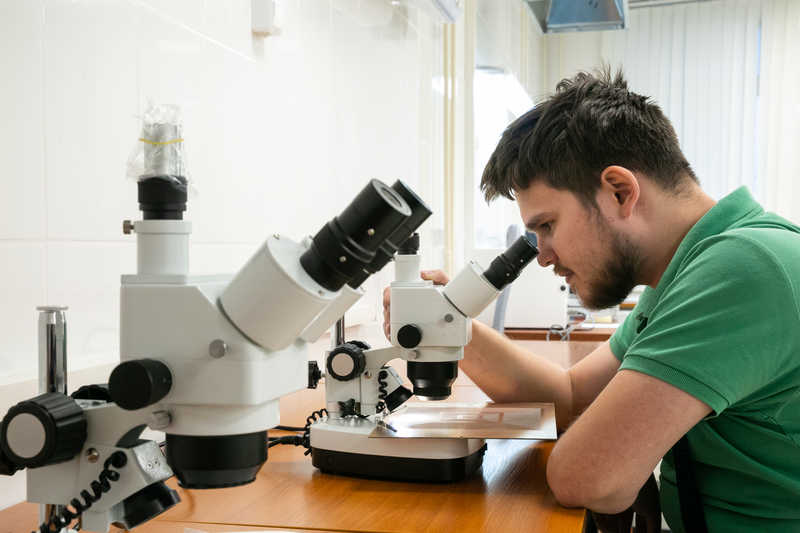
Applications Open for Student Research Paper Competition 2025
The annual Student Research Paper Competition (SRPC) offers students the chance to showcase their work, such as term papers or theses. It is a valuable opportunity to receive expert feedback and recommendations aimed at improving research, as well as to take the first steps in an academic career. Below we outline the key features and deadlines for submitting entries.

From Neural Networks to Stock Markets: Advancing Computer Science Research at HSE University in Nizhny Novgorod
The International Laboratory of Algorithms and Technologies for Network Analysis (LATNA), established in 2011 at HSE University in Nizhny Novgorod, conducts a wide range of fundamental and applied research, including joint projects with large companies: Sberbank, Yandex, and other leaders of the IT industry. The methods developed by the university's researchers not only enrich science, but also make it possible to improve the work of transport companies and conduct medical and genetic research more successfully. HSE News Service discussed work of the laboratory with its head, Professor Valery Kalyagin.

'Science Knows No National Borders'
Foreign scientists successfully continue their work in HSE University laboratories, combining fundamental and applied research to achieve significant results. HSE News Service has spoken to Professor Panos Pardalos, Head of the Laboratory of Algorithms and Technologies for Networks Analysis at HSE University in Nizhny Novgorod, about its work.

‘It’s Thrilling to Have an Opportunity to Discuss Your Scientific Ideas with Interested People’
The International Laboratory of Dynamical Systems and Applications at HSE University–Nizhny Novgorod conducts in-depth theoretical and applied research, including the study of ocean waves, solar corona reconnections, volcanic phenomena, and ship stability. The lab’s researchers, who have received more than 20 significant research grants over the past five years, actively cooperate with Russian and international colleagues from China, Spain, the USA, the UK, Brazil, and other countries. Prof. Olga Pochinka spoke to the HSE News Service about the laboratory’s work.

'The Branch of Medicine That Our Developments Primarily Target Is Cardiology'
The application of mathematical models to the diagnosis and treatment of cardiovascular diseases contributes to the effective detection of patient predispositions and supports the selection of best treatment strategies. The use of mathematical models helps create new diagnostic tools and train neural networks to assist clinicians. Researchers from HSE University and colleagues from Saratov State Medical University are engaged in this work as part of the Mirror Laboratories project. In this interview, Natalya Stankevich, Senior Research Fellow at the International Laboratory of Dynamical Systems and Applications of the HSE Campus in Nizhny Novgorod, talks about what the collaboration has achieved so far.

IX All-Russian Scientific Student Conference: Supporting Early-Career Scientists
The IX All-Russian Scientific Student Conference has taken place at the Nizhny Novgorod campus of HSE University, bringing together almost 200 early-career researchers and experts from 14 cities across Russia, from Kaliningrad to Vladivostok, as well as representatives from the African continent.

Artificial Intelligence as a Catalyst for Sustainable Development
Artificial intelligence is transforming every aspect of life, expanding both our capabilities and our boundaries. At the same time, it presents new challenges for humanity, including concerns about safety, ethics, and environmental sustainability. Today, each neural network leaves a significant carbon footprint. However, with responsible management, AI has the potential to benefit the planet and become a cornerstone of a sustainable future economy. Panos Pardalos, Academic Supervisor of the Laboratory of Algorithms and Technologies for Network Analysis at the HSE Campus in Nizhny Novgorod, emphasised this point as he addressed the XXV Yasin (April) International Academic Conference on Economic and Social Development.

Winners of New RSF Awards Include Projects from Four Campuses of HSE University
The Russian Science Foundation has completed its review of projects submitted for grants to support fundamental and exploratory research by teams, as well as 2022 grant winners applying for project extensions. In addition, interdisciplinary projects for fundamental and exploratory research awarded under the Presidential funding programme have been announced. Projects awarded under each of the three categories include submissions from researchers at all four campuses of HSE University.

Winners of New RSF Awards Include Projects from Four Campuses of HSE University
The Russian Science Foundation has completed its review of projects submitted for grants to support fundamental and exploratory research by teams, as well as 2022 grant winners applying for project extensions. In addition, interdisciplinary projects for fundamental and exploratory research awarded under the Presidential funding programme have been announced. Projects awarded under each of the three categories include submissions from researchers at all four campuses of HSE University.

Hi-Tech Grief: HSE Researchers Explore the Pros and Cons of Digital Commemoration
Researchers at HSE University in Nizhny Novgorod have explored how technological advancements are transforming the ways in which people preserve the memory of the deceased and significant events. Digital technologies enable the creation of virtual memorials, the preservation of personal stories and belongings of the deceased, interaction with their digital footprint, and even the development of interactive avatars based on their online activity. However, these technologies not only evoke nostalgia and provide a sense of relief but can also heighten anxiety and fear, and delay the process of accepting loss. The study has been published in Chelovek (The Human Being).

